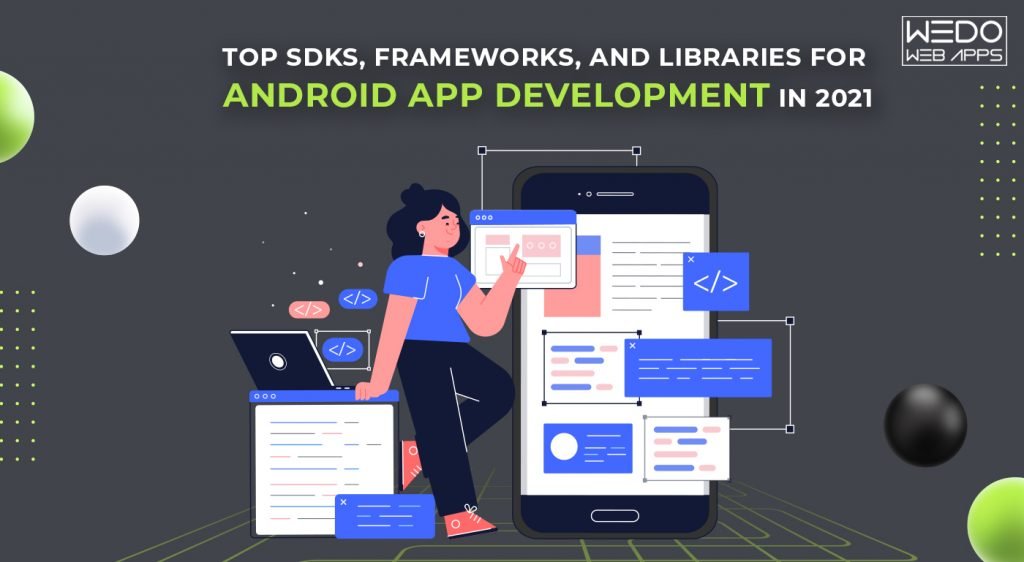30 Apr, 2022 | Android App Development
Top SDKs, Frameworks, and Libraries for Android App Development in 2021

Top Frameworks to Use for Android Application Development
There are many frameworks available for Android Application Development, which also includes many cross-platform frameworks like Flutter and React Native. Let's talk about some of the popular frameworks out there.1.Kotlin
Kotlin is a programming language that has gained outstanding popularity and interest among developers. According to Google's Google's #IO17 announcement, Kotlin has become an official language for Android apps. Its clean language-design and powerful features make it popular among developers. Kotlin aims to bring together the features of programming languages that have proven beneficial for large-scale projects. Even though developers can use Kotlin anywhere Java is used, it is primarily used in android app development. Many companies like Google, Trello/Atlassian, Pinterest, Kickstarter, and Uber are using Kotlin for their benefits. Some of its benefits include writing less code, easy adoption, fully compatible with Java, and imposes no runtime overhead. Kotlin being more fault-proof, the app developed through Kotlin will be easier and cheaper to maintain. Kotlin also helps you in faster development as it is briefer. Fewer lines of code mean less time spent on coding and less money spent on development. Isn'tIsn't this great? You can also transform your app from one platform to another if required.2.Flutter
Flutter is an open-source mobile app SDK developed by Google in 2017. Dart is the language in which Flutter applications are developed. It is quite a simple language to start with and a clear language intended by Google to replace JavaScript. Since Flutter has recently entered the list of cross-platform app development frameworks, the great ideas have caused it to catch on among the developers. Although there are many successful frameworks in the industry, many big companies like The Google Ads app, Alibaba, The eBay Motors app, etc. that are choosing Flutter for android application development. Even Though Flutter is quite capable, it is still new in the industry and continuously updating its features. The most significant benefit of Flutter for most businesses is hiring only one team for both iOS and Android Platforms. Flutter allows developers to build stunning and attractive interfaces. However, there are many other benefits of Flutter Framework such as high productivity, fast and simple development, excellent performance, compatibility, and most importantly, Flutter is open-source.3.React Native
React Native is among the most popular JavaScript libraries used to develop both Android and iOS applications. React Native can help you develop native applications for all devices and operating systems. It's an open-source, cross-platform framework that is developed by Facebook. Using React Native, developers can develop high-performance apps with faster deployment time in less duration. It uses JavaScript and helps in developing rich, responsive, and unique apps. In 2021, React Native has gained popularity in the top mobile app development frameworks. React Native provides a set of unbelievable native components like Views, Text, etc. It supports JavaScript, which is crucial for full-stack development. React Native offers some outstanding features like low code, support for third-party libraries, short development time, live reload, and declarative API for predictive UPI. These are some of the features that make many famous companies like Facebook, SoundCloud, Instagram, Ubereats, and Airbnb use React Native. By migrating to React Native, you'll find a simple architecture, increased app performance, and also you will be easily able to control the builds.4.Ionic
Ionic is an entirely free and open-source framework developed with Angular and Apache Cordova. It allows the developers to develop apps for iOS, Windows, and Android. Ionic is used to build cross-platform mobile applications for high mobile performance. Mobile App Developers use Ionic Framework for powerful and fully-featured mobile application development. One of the most significant advantages of the Ionic Framework is that developers can use several UI elements in their application development. The UI elements like ListViews, Forms, filters, action sheets, navigation menus, and tab bars help developers develop high-performance, robust, and responsive mobile applications. Ionic is a feature-rich cross-platform development framework. It can prove to be the best framework if the developer is well-experienced with HTML, JavaScript, or CSS. There are various features in Ionic Framework like Cordova Plugin, easy and fast development, JavaScript Components, complete control over app building, and much more. These features make Ionic one of the best frameworks for cross-platform development.Useful Libraries for Cross-platform Mobile Application Development
Using third-party libraries in your mobile application development can help you boost the productivity of your app, whether it is iOS or Android. But the important thing is, with so many third-party libraries in the market, which could be the ones worth using? Let's discuss some of the best Libraries to use while cross-platform application development.Android Jetpack
Android Jetpack is a series of libraries that helps the mobile app developers to follow best practices, decrease standard code, and write code that constantly works across all the Android devices and android versions so that the mobile app developers can focus on the code they care about. Below is the list of the libraries most commonly used for developing an android app.Dependency Injection Frameworks
1.Dagger
Dagger is a library developed for low-end devices and is based on annotations. Dagger is based on Java Specification Code 330 and uses code generation. The code generated by Dagger is straightforward to read and troubleshoot.2.Koin
Koin is an intelligent Injection Framework that helps you focus on your app, not on the tools. It is a realistic, lightweight dependency Injection Framework developed in Kotlin. It generates less standard code as compared to Dagger.3.ButterKnife
Butterknife uses annotation development to generate modified Java classes that are based on annotations. It allows you to interpret the views and OnClickListeners. Butterknife also involves findById methods that simplify the code to find views on a View, Activity, or Dialog.Network Libraries
1.Retrofit
In Android Application Development, Retrofit is a REST Client for Android and Java developed by Square Inc. under Apache 2.0. It is a simple library used for network transactions. To seamlessly capture JSON response by web services or web API, Retrofit can be the best choice. It is an easy and fast library to recover and upload JSON or any other structured data through REST-based web services.2.Volley
Volley is a network library developed by Google. It is an HTTP library that makes networking more accessible and faster. It supports the arrangement of network requests. If you are searching for a network client for network operations, Volley will be a better choice than Retrofit.Image Loading
1.Fresco
Fresco is a library created by Facebook. It is the library developed explicitly for loading images. It works faster than the other Image Loading Libraries and does not slow down the app, which is in process. Fresco also reduces the OutOfMemoryError.2.Coil
The coil is the very first image loading library for android app development backed by Kotlin. It is fast, lightweight, easy to use, and a modern library. It is Kotlin-first and makes use of modern libraries, including Coroutines, Okio, OkHttp, and AndroidX Lifecycles.3.Picasso
Picasso is a famous library developed by Square Inc. It displays and caches images. Picasso Library is famous because it requires only one line of code and has a similar coding style for each of its features.4.Glide
Glide is an open-source, fast and efficient image loading library for Android that includes memory and disk caching, media decoding, and merging the resources into the simple and easy-to-use interface. It supports fetching, decoding, and displaying video stills, GIFs, and images.Analytics and Crash reporting
1.Firebase Analytics
Firebase Analytics is a library that helps you to know how visitors are engaging with our application. From the first step, i.e., setup, Firebase Analytics will automatically start tracking defined sets of events, and we can also add our custom set of events for tracking.2.Crashlytics
Crashlytics provides multi-platform support for Android and iOS to help you find out crash analytics and the errors that affect your apps and cause the apps to crash. Moreover, it identifies and highlights the exact line of code that produces problems. It is a free and straightforward tool that SDK to help you make your work easier. Read more about New Trends In Mobile App DevelopmentConclusion
Here we conclude the list of Top SDKs, Frameworks, and Libraries for android app development. There are many SDKs, frameworks for developing your mobile app, but we have collected some of the best ones. Choose the best ones and make your mobile app development exciting and more effortless; knowing these frameworks will help you enhance the performance of your mobile applications.Frequently Asked Questions
What is a Framework in Android?
Framework in Android is the set of API's that help developers quickly and efficiently develop mobile android applications. It comprises tools for designing User Interfaces like buttons, image panes, text fields, and system tools like intents, media players, phone controls, etc.
How do frameworks and libraries help in easy android app development?
Android app development takes more time for development than iOS development due to the wide range of android devices. Fortunately, new Android frameworks, SDKs, and libraries can help you reduce the complexity of development, increase development speed, and optimize your application's performance.
What is cross-platform mobile app development?
Cross-platform mobile app development, also known as hybrid mobile app development, is an approach that lets the developers develop an app that is compatible with various operating systems and platforms like android, iOS, windows.
The cost of hiring Ionic App Developers for Android app development can vary based on factors such as the complexity of your app, its features, the level of customization required, and the experience and location of the developers. It's best to discuss your project requirements with potential developers and obtain detailed cost estimates before making a decision.

